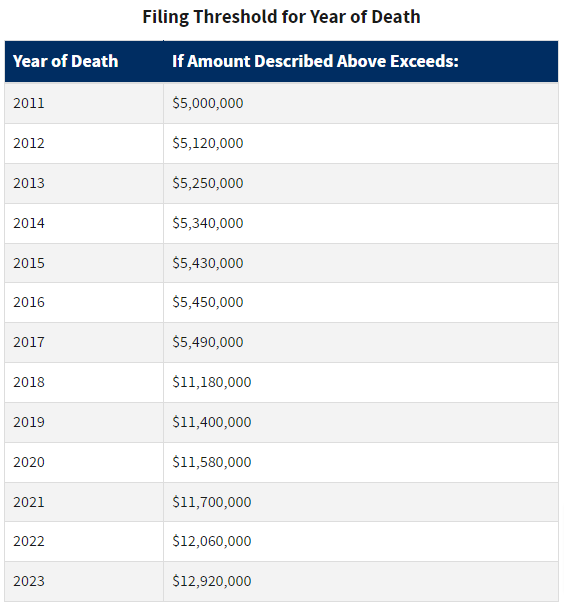*Originally written July 9, 2021. Updated June 16, 2022, with updated tax laws.
Estate planning is a must for anybody who has substantial assets to leave to their heirs. Having a will isn't enough. Depending on the value of your estate, your heirs may be required to pay estate taxes on their inheritance.

CMP works with clients every day to minimize estate taxes, ensure a smooth succession plan is in place, and protect their heirs via estate planning. With that in mind, in this post, we will you can legally minimize or avoid estate taxes.
Ready? Let's talk about some estate tax strategies.
(Oh, and stay with us to the end, and we'll let you know the most expensive state to die in).
What is Estate Tax?
The estate tax is a tax that may be the responsibility of your heirs if the value of your estate is over the amount specified by the Internal Revenue Service and/or your state taxing agency. 13 states have an estate tax and they are the following:
- Connecticut
- District of Columbia
- Hawaii
- Illinois
- Maine
- Maryland
- Massachusetts
- Minnesota
- New York
- Oregon
- Rhode Island
- Vermont
- Washington
The federal estate tax applies to most heritable assets, including cash, real estate, and retirement accounts. We'll get into more detail about the specifics in the next section.
How Does the Estate Tax Work?
Before we explain how to avoid estate tax, we should tell you how the tax works. The federal estate tax applies to all estates over a specified amount. The amount referred to as the federal estate tax exemption increases annually. For the 2017 tax year, the federal estate tax exemption was $5.49 million for individuals and $10.98 million for married couples. The amounts have increased under the Tax Cuts & Jobs Act of 2017, as follows:
- The 2018 exemption is $11.18 million ($22.36 million for married couples)
- The 2019 exemption is $11.4 million ($22.8 million for married couples)
- The 2020 exemption is $11.58 million ($23.16 million for married couples)
- The 2021 exemption is $11.7 million ($23.4 million for married couples)
- The 2022 exemption is $12.06 million ($24.12 million for married couples)
We should note here that the 2017 tax law only increased these amounts through 2025. After 2025, the exemption amount will likely revert to what it was before 2017, which means there's a ticking clock on the increased exemption. Fortunately, there are some things you can do to protect your heirs.
Be aware that your heirs will only be taxed on amounts that exceed the exemption. For example, someone who inherited a $15 million estate in 2021 from a single parent would be taxed on the $3.3 million over the exempted amount of $11.7 million.
State estate taxes often have different parameters than federal taxes. For estate tax purposes, it's important to know what the limits are in your state so that you can adjust your estate planning accordingly.
What is the federal estate tax rate?
As you likely would expect, the federal estate tax rate is ever-changing. Here is a link to the federal estate tax rate we've also added the federal tax rate in graphic form below.

Can Estate Tax Be Avoided?
A couples of the questions we frequently hear from our clients is:
How can I reduce my estate tax liability? What estate planning strategies can I use to reduce my taxes?
It can be frustrating for people who have worked their entire lives to accumulate wealth to leave to their children and grandchildren to know that their heirs may be required to pay income taxes on property that has already been taxed. For that reason, many have pushed to repeal federal estate taxes.
One of the best ways to reduce the tax burden for your heirs is to find ways to reduce your taxable estate. If your estate value falls under the federal threshold for estate taxes, your heirs will not be required to pay estate taxes.
The good news is that there are many ways to reduce or avoid estate taxes for your heirs with estate planning. We will review nine strategies in the next section.
How Can I Reduce or Avoid Estate Taxes?
You want to leave your estate assets to your heirs, and you don't want them to be burdened with a huge tax bill. Fortunately, there are many ways to maximize their tax savings through estate planning. If you can reduce your gross estate value to an amount that is lower than the federal threshold for the tax, your heirs can avoid the estate tax. Let's review nine of the best ways to minimize your taxes.
1. Make Charitable Donations
You already know that charitable donations are tax-free and can be deducted from your federal income tax return. If you make your donations to qualified organizations, then there is no limit on how much you may deduct on your tax returns. For non-qualified organizations, the limit is usually 60% of your gross income and the remaining donations are generally taxable.
Qualified organizations include the following.
- Any organization set up for charitable, religious, educational, scientific, or literary purposes, or the prevention of cruelty to children or animals.
- A church, synagogue, or other religious organization.
- A domestic fraternal organization.
- A veterans' organization.
- A non-profit volunteer fire company.
There are additional rules that apply. For example, donations to a fraternal organization are tax-deductible only if the donation is used exclusively for charitable purposes. You should make sure you understand how your donation will be used before you claim it as a deduction.
2. Set Up a Family Limited Partnership
A family limited partnership (FLP) may be an option because it offers your heirs a three-way tax break on income, estate, and gift taxes. You would set up the partnership with help from a financial advisor as part of your estate plan. While you're alive, your investments are still within your control. However, at a specified time, the management of the funds falls to your heirs.
The benefit of setting up a limited partnership is that it protects your estate from people who shouldn't have access to it, such as ex-spouses or creditors while allowing you to maintain control. You should work with a tax expert to decide when to irrevocably transfer assets to your heirs. Assets that are irrevocably transferred before your death are not required to go through the probate process.
Want to know more about probate costs? The Balance has an article on probate costs, and details probate costs often involve:
- Court Fees (a few hundred dollars)
- Executor Fees (varies, but can be 3-4%)
- Attorney Fees (dictated by state law, but they can ask for 'extraordinary fees')
- Accounting Fees (varies based on the complexity and amount of estate)
- Appraisals & Business Valuation Fees (hundreds to thousands for appraisals, several thousands and likely more for business valuations)
- Bond Fees (few hundred to tens of thousands of dollars)
- Miscellaneous Fees (varies)
3. Use the Marital Deduction
There are significant benefits to being married regarding minimizing the tax burden for your heirs. The exemption amounts for taxable estates apply separately to each spouse. That means if you had a $20 million estate in 2021 and you set up a living trust, you can specify that your estate will be split 50/50 between you and your spouse. Let's look at how that might work.
If one spouse dies, $10 million of the estate is considered theirs for taxation purposes. The deceased spouse would have an estate that falls below the exemption amount and that money will be distributed following their wishes without taxes. The surviving spouse maintains control over the remaining $10 million, and if they die while the increased exemption is still in place, their heirs will avoid taxes, too.
4. Set Up a Trust
We already mentioned setting up a limited family partnership, but there's another option that can help you as well: setting up a charitable trust. With a charitable trust, you can designate part of your estate to the trust, thus reducing your taxable estate. For example, if you decided to sell a business that you own, you could designate the proceeds to a charitable trust and effectively remove that money from your estate.
A related option is to set up an irrevocable trust (or more than one) for your heirs. Trusts are a reliable form of asset protection because they permanently transfer assets from your estate to your heirs while still allowing you to specify how the money can be used.
5. Move to a State without Estate Taxes
This solution might seem extreme but if you have a large estate it may be worth considering. As of June 2022, 33 states have no estate tax. That doesn't mean you are home free though. Be sure to check with a qualified estate planning professional to make sure you cover all your bases. For those wondering, Utah is one of those 33 states with no estate taxes.
One important thing to keep in mind is that residency rules may vary from state to state. For example, if you own multiple properties, you should be cautious. Be sure to establish your residency to avoid having any debate about which state gets control of your tax liability.
6. Give Gifts Instead of Inheritances
Under federal law, you may give gifts up to $16,000 (2022 tax law) per year per recipient without you (or the person you give to) being required to pay a gift tax. This is known as the gift tax exclusion. If you're worried about taxation for your heirs, you may give them annual gifts up to $16,000 without paying taxes.
You should know that the annual gift tax exclusion of $16,000, is per person and per recipient. That means if you're married, you and your spouse can each give $16,000 to the same person for a total of $32,000 per year, per recipient.
If you exceed that limit, you will be required to file a gift tax return with the IRS. Also, keep in mind that lifetime gifts count toward your federal estate tax exemption.
The lifetime gift tax exemption is $12.06 million as of 2022. This means you can give up to $12.06 million as gifts throughout your life without having to pay taxes on it.
7. Set Up a Donor Advised Fund
If you want to give money to charity, setting up a donor-advised fund (DAF) is a good way to minimize the tax burden for your heirs. A donor-advised fund is a fund with money that can be invested and earn income with the caveat that the money must be used for charitable purposes.
Many of our clients like donor-advised funds because they can direct how the funds will be used during their lifetimes and allow their heirs to direct the funds after they die. You can even take a tax deduction when you set up the DAF.
8. Fund a Qualified Personal Residence Trust
For many people, real estate is one of their biggest assets, and removing a personal residence from an estate can do a great deal to reduce taxes for your heirs. One option is to create a qualified personal residence trust or QPRT as part of your estate planning.
With a QPRT, you can remove your home from your estate and continue to live in it during the retained income period. If you outlive that period, you will be required to pay rent to your heirs under the terms of the QPRT. You can transfer your home to the trust now with a retained income period of 20 years and continue to live there rent-free.
Strong financial planning extends beyond estate strategies and into how your business positions itself for growth. Our latest post on bonding capacity for contractors breaks down how CPA-reviewed financial statements help contractors build trust with sureties, qualify for higher bonding limits, and pursue larger projects with confidence. See how the right financial reporting approach can support long-term stability and expansion.
9. Buy an Extra Life Insurance Policy to Pay the Tax
Our final estate planning option is ideal for people who are still young enough to buy affordable life insurance. It is not suitable if you are near the end of your life. A good way to provide your heirs with the money they need to pay taxes on what they inherit is to buy a life insurance policy with a payout that's high enough to cover all estate taxes plus inheritance tax if your state has one.
The best way to determine if your life insurance proceeds will cover your heirs’ taxes is to consult with a tax professional who can help you calculate the amount of estate and inheritance taxes and advise you on how much life insurance you would need to pay them.
Protect Your Family Assets with Proper Estate Planning
The most important thing to remember about protecting your family assets is that with professional tax advice, you can use financial planning to allow your heirs to inherit your estate without paying high tax rates on the money they receive.
We're here to help. Contact us today to learn about our estate planning services so you can ensure your family doesn't get hit with a big tax bill. Ready to talk now? Schedule an appointment with one of our estate & succession planning experts by clicking the button below.
Most expensive state to die in? Connecticut.


















